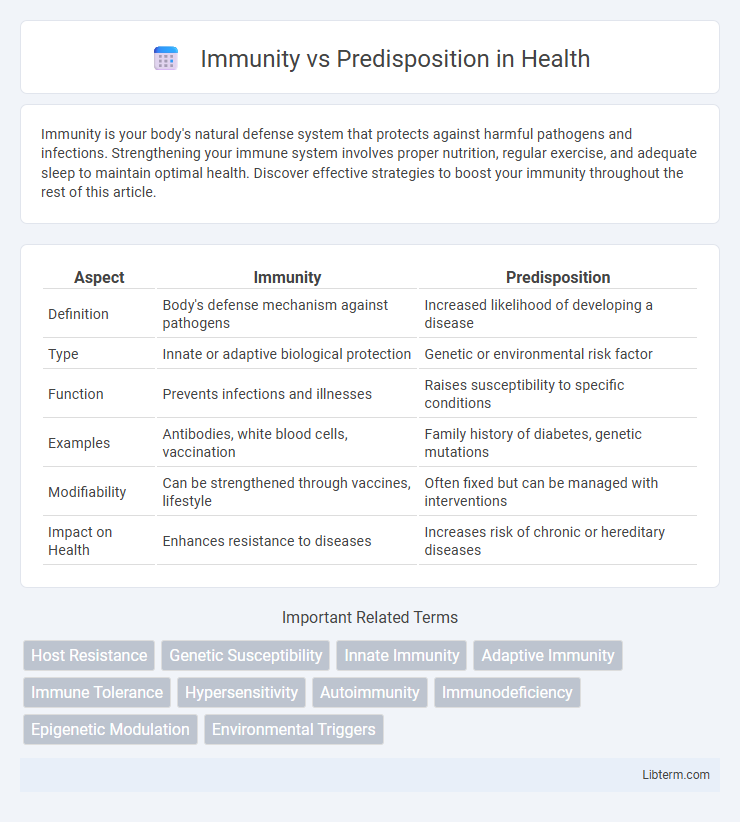Immunity is your body's natural defense system that protects against harmful pathogens and infections. Strengthening your immune system involves proper nutrition, regular exercise, and adequate sleep to maintain optimal health. Discover effective strategies to boost your immunity throughout the rest of this article.
Table of Comparison
| Aspect | Immunity | Predisposition |
|---|---|---|
| Definition | Body's defense mechanism against pathogens | Increased likelihood of developing a disease |
| Type | Innate or adaptive biological protection | Genetic or environmental risk factor |
| Function | Prevents infections and illnesses | Raises susceptibility to specific conditions |
| Examples | Antibodies, white blood cells, vaccination | Family history of diabetes, genetic mutations |
| Modifiability | Can be strengthened through vaccines, lifestyle | Often fixed but can be managed with interventions |
| Impact on Health | Enhances resistance to diseases | Increases risk of chronic or hereditary diseases |
Understanding Immunity: Definition and Types
Immunity refers to the body's ability to resist and defend against harmful pathogens through specific biological mechanisms. It is categorized into innate immunity, which provides immediate, non-specific defense, and adaptive immunity, which offers targeted and long-lasting protection by remembering past infections. Understanding these types helps in comprehending how the immune system adapts to various threats and maintains overall health.
What Does Predisposition Mean in Health?
Predisposition in health refers to an increased likelihood of developing a particular disease or condition based on genetic, environmental, or lifestyle factors. Unlike immunity, which provides protection against specific pathogens, predisposition indicates a susceptibility rather than guaranteed onset of illness. Understanding genetic markers and family history plays a crucial role in identifying health predispositions for preventive care.
The Role of Genetics in Predisposition
Genetics plays a crucial role in an individual's predisposition to certain diseases by influencing immune system functionality and susceptibility to pathogens. Variations in genes such as HLA (human leukocyte antigen) impact immune response efficacy, making some people more vulnerable to autoimmune disorders and infectious diseases. Understanding these genetic factors helps in predicting disease risk and developing personalized medical treatments to enhance immunity.
How the Immune System Works
The immune system protects the body by identifying and neutralizing harmful pathogens through innate and adaptive defenses. Innate immunity provides immediate, non-specific responses using barriers and cells like macrophages, while adaptive immunity develops targeted responses via lymphocytes that remember specific antigens. Immunity strengthens through exposure and vaccination, contrasting with predisposition, which refers to genetic or environmental factors increasing disease susceptibility.
External Factors Affecting Immunity
Environmental conditions such as pollution, temperature fluctuations, and exposure to harmful chemicals significantly impact immunity by either enhancing or weakening the body's defense mechanisms. Nutritional status, stress levels, and lifestyle choices like sleep patterns and physical activity play crucial roles in modulating immune responses. Pathogen exposure and living conditions, including sanitation and crowding, further influence the predisposition to infections by affecting immune system resilience.
Environmental Influences on Predisposition
Environmental influences on predisposition play a crucial role in determining an individual's susceptibility to diseases. Factors such as pollution, diet, lifestyle, and exposure to toxins can alter gene expression and immune system responses, increasing the likelihood of developing chronic conditions. Understanding how environmental triggers interact with genetic predisposition helps in designing personalized prevention strategies to improve overall immunity and health outcomes.
Immunity vs. Predisposition: Key Differences
Immunity refers to the body's ability to resist infections and diseases through the action of the immune system, involving mechanisms such as antibodies and white blood cells. Predisposition indicates a genetic or environmental susceptibility that increases the likelihood of developing certain conditions or diseases. Understanding the key differences between immunity and predisposition is essential for developing targeted prevention and treatment strategies in healthcare.
Can Immunity Overcome Genetic Predisposition?
Immunity can play a crucial role in mitigating the effects of genetic predisposition by strengthening the body's defense mechanisms against diseases linked to inherited genes. While genetic predisposition increases susceptibility to certain conditions such as autoimmune disorders, cancer, or diabetes, a robust immune system enhanced through vaccinations, healthy lifestyle choices, and early medical interventions can reduce the likelihood or severity of disease manifestation. Ongoing research in immunogenetics explores how immune modulation therapies might overcome genetic risks, offering promising paths to personalized medicine and improved health outcomes.
Strategies to Strengthen Immunity and Reduce Risks
Boosting immunity involves incorporating a balanced diet rich in vitamins C and D, regular exercise, adequate sleep, and stress management techniques to enhance the body's natural defense mechanisms. Reducing predisposition to diseases requires genetic counseling, avoiding environmental triggers like pollutants, and maintaining healthy lifestyle choices such as quitting smoking and limiting alcohol consumption. Vaccinations and routine health screenings further support immune function and minimize risk factors associated with hereditary or acquired conditions.
Future Perspectives: Advances in Personalized Medicine
Future perspectives in immunity versus predisposition emphasize the integration of genomic data and immune profiling to tailor individualized preventive and therapeutic interventions. Advances in personalized medicine leverage CRISPR gene-editing, machine learning algorithms, and biomarker discovery to predict susceptibility and enhance immune resilience. Precision immunotherapy and customized vaccine platforms are poised to transform disease management by aligning treatment with each individual's unique genetic and immunological landscape.
Immunity Infographic

 libterm.com
libterm.com